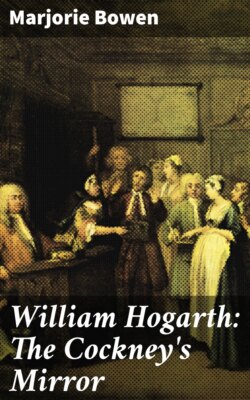Читать книгу William Hogarth: The Cockney's Mirror - Bowen Marjorie - Страница 18
На сайте Литреса книга снята с продажи.
* * *
ОглавлениеTable of Contents
It is well to complete our brief survey of eighteenth-century London with some account of those two great places of entertainment, Vauxhall and Ranelagh, which for many years were of such importance in the social life of the capital and supposed to be responsible for much of its folly and immorality.
Ranelagh was situated at Chelsea, convenient for water travel and open from April to July; for a shilling it was possible to reach the pleasure gardens by hackney-coach from Hyde Park Corner, along a lamp-lit road.
The price of admission was half a crown, and the company who paid to enter were 'genteel and polite,' while the entertainments were of a very refined order—at least, according to the claims of the proprietors.
On the death of the Earl of Ranelagh, his mansion and park had been purchased by a company which converted them into a pleasure resort; this work was completely finished by 1740.
The main attraction was the Rotunda, built of wood in the interests of economy; this building was of the Doric order, and its handsome porticoes, galleries, arcades, fluted pillars with plaster of Paris termini were much admired, but the greatest marvel was the fireplace structure that rendered the whole building very warm and comfortable and could 'not smoke or become offensive;' it had four 'faces,' stood in the centre of the hall and was supported by eight pieces of cannon filled with lead. About seven in the evening a number of candles in glass lamps were lit in this Rotunda and a concert began; there was a large orchestra and famous singers were employed; fifty-two boxes, including one for the King, accommodated the audience; red baize benches were provided for those who could not crowd into these loges, which were adorned with droll paintings and opened at the back on to the gardens.
On the plaster of Paris floor was a mat 'to prevent people from catching cold,' the ceiling was painted olive colour with a rainbow across it, and 'no words could express the grandeur of the sight' when the twenty chandeliers, each containing thirteen candles, were lit.
Breakfasts were at first taken here, but later forbidden by Act of Parliament; masquerades were, however, permitted, and these were the scenes of much licence and intrigue, since everyone, masked or disguised, roamed about freely bent on pleasure; so notorious became these carnivals that they also were in time suppressed.
The gardens were lit by lamps, contained well-laid-out walks and convenient little temples and pavilions; there was a canal, flower-parterres, grottos, and a pipe that drained all 'foul waters' into the Thames.
These gardens might be visited during the day at the cost of one shilling, but 'for reasons too obvious to be pointed out' no intoxicating liquors were sold at Ranelagh at any time; it is not clear whether they might be brought in or not.
A large amphitheatre had been erected for servants to wait in, so that they might be unseen, yet handy when required; in short, nothing had been forgotten that might induce the comfort and enjoyment of the visitors to Ranelagh.
